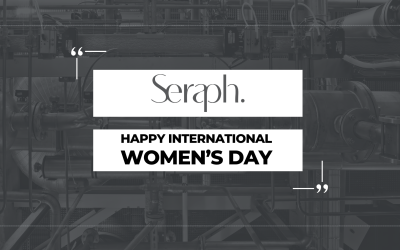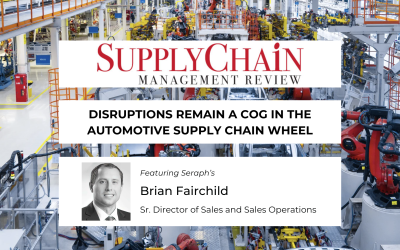Meet the team is a series where junior Seraph team members lead conversations with senior Seraph consultants to learn from their experiences.
Today we present a conversation with Seraph’s Hector Soto, who brings 30+ years of experience in supply chain management, automotive, and manufacturing. Before consulting, Hector was the Director of San Luis Potosi Automotive Cluster previously holding leadership positions at Kirkwood Industries (Grupo Merik) and Eaton Corp.
Supply chain management requires holistic manufacturing knowledge
Justin: What are the biggest challenges that supply chain managers face today?
Hector: The role of the supply chain manager grows each year. There is a need to understand all of the fields related to supply chain management and all of the adjacent processes.
J: What are examples of those processes?
H: The four main processes for supply chain management are plan, source, make and deliver.
To achieve the big four, you need to understand the related functions. This spans from order entry, to demand management, master scheduling, production planning, production control, purchasing, and of course, logistics and trade compliance.
Supply chain management is a broad function. In order to excel at the position, you need to have a holistic vision. You need to be exposed and experience these fields firsthand through cross-training and working alongside all of the functions in a business. Learning from books and classes is in addition to, not a substitute for, practical training. Without knowing production, marketing, forecasting, sales, and maintenance it’s difficult to succeed.

Globalization and digitalization of supply chains add complexity
J: Have supply chains become more complicated and complex in the years that you’ve worked?
H: Absolutely. Success not only requires having a holistic vision and a wall-to-wall command of logistics, but also an international mindset. Supply chain management is truly global. To execute on the commitments of purchasing and sales, a supply chain manager must master the different geographies, trade agreements, and cultures that come with international commerce.
The digitalization of the supply chain is a double-edged sword. On one hand, it allows for new capabilities and eliminates slow paperwork, but on the other, it drives complexity. You now need to deal with a lot more information.
Mastering both government regulations and geographical differences is essential
J: How is the growth of electric vehicles (EV) impacting SCM?
H: Although EVs are simpler in terms of the number of components, it introduces a new set of important commodities and suppliers. Since the space less mature than the internal combustion engine, it requires a commitment to remain current. As an added difficulty, with new development, comes new government regulation.
J: In your previous roles in industry managing sites across Mexico and Brazil, how did government regulation impact the supply chain?
H: Mexico is the country that has the most free trade agreements in the world (in practice we primarily use the USMCA, but that’s a different story). Brazil is a completely closed economy. Due to protections, it is extremely difficult to import something into Brazil and remain competitive.
These governmental and geographical differences can quickly disrupt corporate strategies. As an example, from my previous work, our initial corporate plan was to use the same logistics company all across Latin America. In Mexico, it was easy. We took the corporate contract from the U.S. logistics provider and implemented that across Mexico. Brazil was a completely different story. Even though the global logistics provider had a presence in Brazil, they were not equipped to handle the Amazon region. Instead, we had to dig in and award the business to a local company that really understood the geography and all of the difficulties about moving around in that zone.
Companies cannot assume they will be able to copy-paste a supply chain strategy from one country to another.
Mexico still has a massive opportunity for growth
J: Previously, you managed an automotive cluster within Mexico that involved attracting new business to the region. Where are the challenges and opportunities for growth in Mexican manufacturing?
H: In Mexico we have a tremendous opportunity to keep growing the country. Globally, Mexico is the:
- 7th largest manufacturer of vehicles
- 4th largest vehicle exporter
- 5th largest producer of auto parts
The most important relationship is with no doubt with the U.S. If NAFTA was important, the USCMA is twice as important (the agreement is known as T-MEC in Mexico). In five years, the regional value in automotive content needs to increase from 62.5% to 75%. That means a big challenge. This is huge opportunity for Canada, the United States and Mexico to work as an integrated region.
This change creates a lot of opportunities for Mexican auto parts production. Also, because of the pandemic, Mexico will continue to be the target for nearshoring and reshoring. The OEMs realize how fragile the supply chain can be overseas and will place a value on proximity.
J: That sounds like there will be a lot of supply chain work to achieve the 75% value content, moving supply chains from Asia to Mexico. Is there a shortage of supply chain professionals in Mexico and North America? Are we prepared for the growth?
H: There is a shortage of talent in the supply chain management function. Equally, there is an opportunity to professionalize and work with people in this area. Technical knowledge is only table-stakes. A supply chain manager also needs soft skills. Successful supply chain management requires constant learning and sharp problem-solving abilities. SCM must be insanely customer-focused and operate with a very high sense of urgency. At the same time, you need to be very emotionally intelligent, in order to know when to take time to make the right decisions. In this role, you really need to be an agent of change.
Email Hector
About Seraph:
Seraph’s team of operational managers and senior consultants intercede on our client’s’ behalf to fix crises putting businesses at immediate risk, turnaround situations damaging the bottom line, and restructure operations to improve the balance sheet. Seraph has successfully delivered projects in the Americas, Europe, China, and India. Seraph’s industry expertise includes Aerospace, Automotive, Energy Infrastructure, Healthcare, and Medical Devices. Through our other operating companies, we are continually looking for distressed situations where we can put our expertise and capital to work to create value.






